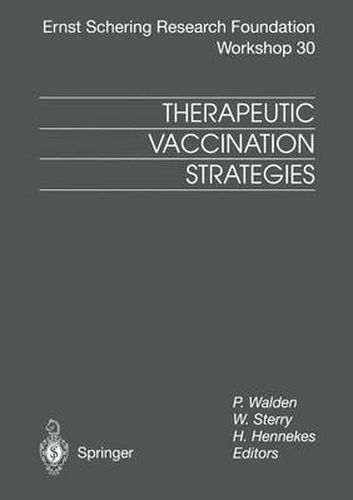Readings Newsletter
Become a Readings Member to make your shopping experience even easier.
Sign in or sign up for free!
You’re not far away from qualifying for FREE standard shipping within Australia
You’ve qualified for FREE standard shipping within Australia
The cart is loading…






This title is printed to order. This book may have been self-published. If so, we cannot guarantee the quality of the content. In the main most books will have gone through the editing process however some may not. We therefore suggest that you be aware of this before ordering this book. If in doubt check either the author or publisher’s details as we are unable to accept any returns unless they are faulty. Please contact us if you have any questions.
The induction of immune responses against tumor cells by vaccination is rapidly evolving as a therapeutic modality with new potentials for the treatment of cancer. It is based on the fact that our immune system can identify tumor cells and, once activated, is capable of developing specific immunity against the neoplastic cells. Numerous observations and intense research clearly document the major contribution of the immune system to the prevention of cancer. And there are many re ports of patients suffering from malignant melanoma or other tumors who mount a spontaneous immune response against their tumor cells that results in tumor regression. Based on the recent advances in our understanding of the compo nents of our immune system, their interactions and the regulation of immune responses, we are now able to design vaccination strategies that induce or enhance cell-mediated immunity against tumors. A ma jor advancement came with the identification and characterization of relevant tumor antigens, which are suitable target structures for anti-tu mor immune response. First clinical trials using such vaccine strategies have yielded encouraging results in patients. However, in spite of many reported cases of successful therapy of cancer by vaccination many patients still do not experience relief after such treatments. These initial clinical trials and the accompanying investigations have revealed a number of important results that indicate the direction of future re search and development in the field.
$9.00 standard shipping within Australia
FREE standard shipping within Australia for orders over $100.00
Express & International shipping calculated at checkout
This title is printed to order. This book may have been self-published. If so, we cannot guarantee the quality of the content. In the main most books will have gone through the editing process however some may not. We therefore suggest that you be aware of this before ordering this book. If in doubt check either the author or publisher’s details as we are unable to accept any returns unless they are faulty. Please contact us if you have any questions.
The induction of immune responses against tumor cells by vaccination is rapidly evolving as a therapeutic modality with new potentials for the treatment of cancer. It is based on the fact that our immune system can identify tumor cells and, once activated, is capable of developing specific immunity against the neoplastic cells. Numerous observations and intense research clearly document the major contribution of the immune system to the prevention of cancer. And there are many re ports of patients suffering from malignant melanoma or other tumors who mount a spontaneous immune response against their tumor cells that results in tumor regression. Based on the recent advances in our understanding of the compo nents of our immune system, their interactions and the regulation of immune responses, we are now able to design vaccination strategies that induce or enhance cell-mediated immunity against tumors. A ma jor advancement came with the identification and characterization of relevant tumor antigens, which are suitable target structures for anti-tu mor immune response. First clinical trials using such vaccine strategies have yielded encouraging results in patients. However, in spite of many reported cases of successful therapy of cancer by vaccination many patients still do not experience relief after such treatments. These initial clinical trials and the accompanying investigations have revealed a number of important results that indicate the direction of future re search and development in the field.